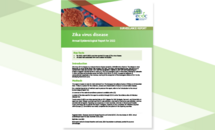Zika virus disease - Annual Epidemiological Report for 2022
Zika virus (ZIKV) disease is a mosquito-borne disease caused by Orthoflavivirus zikaense. The disease is most frequently an acute febrile illness with myalgia, skin rash, arthralgia, and neurological signs. Sub-clinical and asymptomatic cases are common. ZIKV was first recognised in Uganda in 1947 and sero-epidemiological evidence suggests wide distribution in Africa. The virus emerged in 2007 in Micronesia, followed by outbreaks in other countries and territories across the Pacific (2013–2014). In 2015, it caused an epidemic of unprecedented magnitude in the Americas, leading to the recognition of the teratogenic effects of ZIKV to the developing foetal brain.
Download








